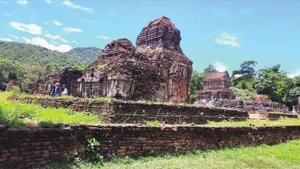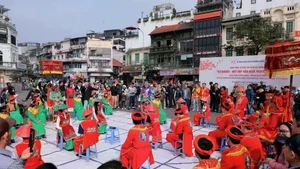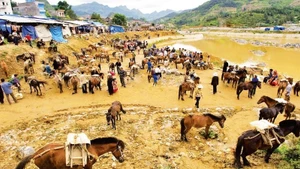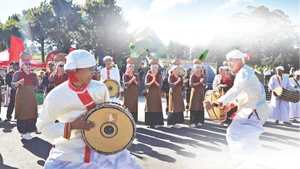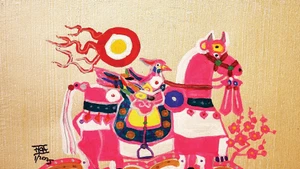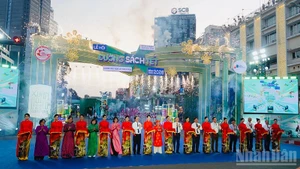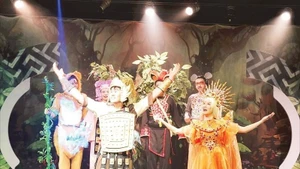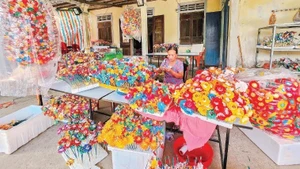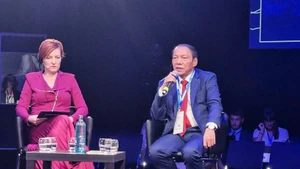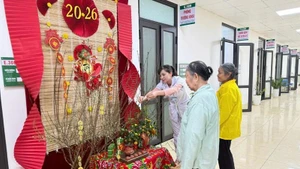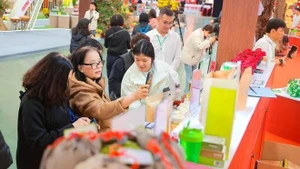Based on the Party’s viewpoints and orientations, a learning society can be seen as one that values history, nurtures, and upholds core cultural values. The article by General Secretary To Lam not only serves as a guiding framework for integrating lifelong learning with the preservation of national culture but also presents a strategic vision: placing education as the bridge between tradition and the future.
Preservers of national cultural identity
In everyday life, there are numerous exemplary individuals whose commitment to lifelong learning forms a solid foundation for preserving and promoting cultural identity, while also nurturing patriotism and national pride.
Tong Thi Phong, former Politburo Member and former Vice Chairwoman of the National Assembly, is the author of the renowned dance work “The Dance of Solidarity”. Even after her significant contributions to the country, she remains deeply engaged in researching, preserving, and spreading traditional cultural values.
With a profound love for national art, she meticulously compiled an instructional manual detailing every movement of “The Dance of Solidarity”. This work not only systematises teaching and learning process but also plays a crucial role in preserving and promoting Vietnam’s cultural identity amid the fast-paced currents of modern life.
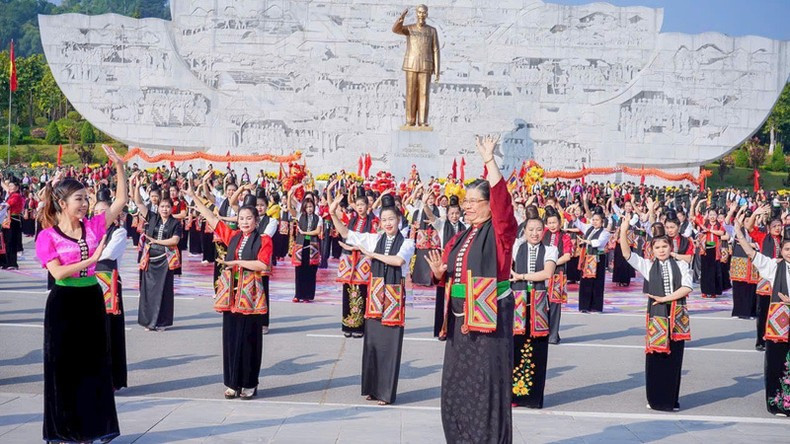 |
| The author and performers of The Dance of Solidarity at the Northwest Square in the northern mountainous province of Son La. |
Another notable example of lifelong learning and cultural preservation is the experiential classes conducted by artisan Nguyen Tan Phat in the ancient village of Duong Lam, in Son Tay Town, Hanoi. These sessions are not only a way to keep traditional crafts alive — such as making to he (toy figurines), woodblock printing, lacquer painting, and pottery — but also help stimulate local tourism and economic development.
Participants not only learn the crafts but also gain deeper insight into the unique culture of the ancient village, thereby contributing to the sustainable development of cultural values and promoting the image of Vietnamese craft villages to the world.
Another significant example of lifelong learning in association with cultural preservation can be found at the University of Languages and International Studies (ULIS), Vietnam National University, Hanoi. In addition to fulfilling its educational mission, the university has recently established the Department of Languages-Vietnamese and Southeast Asian Cultures, aiming to introduce and promote the Vietnamese language, culture, and people to international friends through linguistic education.
According to Nguyen Xuan Long, Rector of ULIS, the programme not only targets Vietnamese students but also foreigners and overseas Vietnamese.
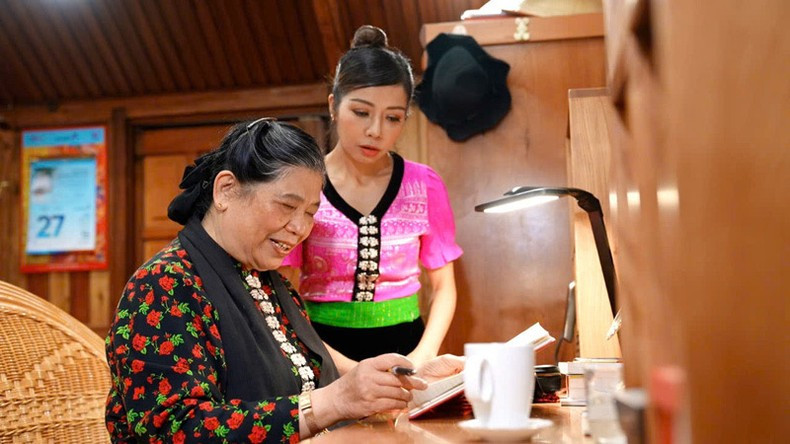 |
| Former Vice Chairwoman of the National Assembly, Tong Thi Phong, remains deeply passionate about researching, preserving, and promoting traditional cultural values. |
Students not only gain in-depth knowledge of the Vietnamese language, culture, and Vietnamese teaching methodologies, they also have the opportunity to engage in experiential activities such as the Tet Programme and field visits to historical and cultural sites like the Vietnam National Village for Ethnic Culture and Tourism, as well as other notable destinations.
These experiences enhance their communication skills and deepen their understanding of Vietnam’s culture, people, and heritage — contributing to the preservation and international promotion of traditional Vietnamese cultural identity.
In the near future, the Ministry of Culture, Sports and Tourism will implement a range of policies and comprehensive solutions to promote lifelong learning, raise public intellectual standards, and preserve national culture.
Key efforts will include widespread campaigns to raise awareness — particularly within government agencies and organisations — about the role of lifelong learning in preserving culture. The ministry also plans to propose that the government increase investment in educational infrastructure, especially in remote and disadvantaged areas, as well as develop online learning platforms on culture, history, and traditional arts. Moreover, the expansion of the “Mobile Library Van” programme will help bring knowledge directly to local communities.
The ministry is also accelerating the digitisation of cultural materials, creating digital museums, virtual exhibitions, and online learning resources to help safeguard and broaden cultural access-especially for young generations.
Standing Deputy Minister of Culture, Sports and Tourism, Le Hai Binh, emphasised: “These integrated solutions will establish a sustainable cultural ecosystem, preserve heritage, and expand learning opportunities for all, especially the youth.”
Concrete measures to promote lifelong learning
In the near future, the National Assembly will revise and enact laws to create favourable mechanisms and policies for the dissemination of knowledge, raising public awareness, and encouraging participation from all classes of society in the preservation and promotion of national cultural identity.
Associate Professor Dr Nguyen Dac Vinh, Member of the Party Central Committee and Chairman of the National Assembly's Committee for Culture and Society, shared: “Recently, following the review of 10 years of implementing Resolution No. 29-NQ/TW, the Politburo issued Conclusion No. 91-KL/TW, which emphasises the task of focusing on the review, amendment, supplementation, and completion of mechanisms, policies, and laws on education and training, aiming to remove bottlenecks. Specifically, it is necessary to promptly develop a Law on Teachers and a Law on Lifelong Learning. The Committee for Culture and Society is actively coordinating with the Ministry of Education and Training to finalise the new draft Law on Teachers, to be submitted to the National Assembly for consideration and approval at its 9th session, scheduled in May 2025.”
The Ministry of Education and Training is actively developing the draft Law on Lifelong Learning. The Committee for Culture and Society will take the initiative in organising field surveys, working closely with relevant ministries, sectors, localities, and experts to jointly develop policies, with particular focus on improving the education system towards openness, flexibility, and interconnectivity, ensuring opportunities for lifelong learning for all citizens and aligning education and training with the demands of the labour market.
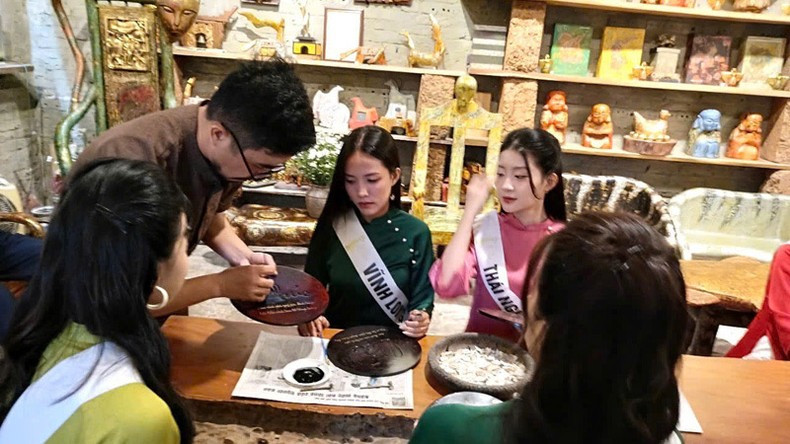 |
| Contestants of the Miss Ao Dai Pageant engaged in traditional craft activities during their visit to Duong Lam Ancient Village. |
Once the Draft Law is included in the National Assembly’s legislative programme, the committee will collaborate closely to examine in accordance with legal regulations. In parallel, the Committee will continue reviewing and proposing amendments to related legislation such as the Law on Education, the Law on Higher Education, and the Law on Vocational Education, aiming to concretise the spirit of lifelong learning and ensure legal consistency and coherence.
Le Hai Binh affirmed: “The cultural sector is implementing a range of comprehensive solutions, with communication through the press and social media playing a key role. Integrating cultural education into schools and communities and encouraging a spirit of self-directed learning within families are central strategies.”
However, the preservation and promotion of culture is not the sole responsibility of the cultural sector-it requires the concerted efforts of the entire society. In addition to state support, organisations and businesses can sponsor educational projects, support artisans and organising programmes to introduce cultural heritage to young generations.
The digitisation of cultural materials and the development of online learning platforms represent a crucial direction, enabling the young generation to access knowledge in a flexible and dynamic way. Training models that combine theory and hands-on experience at craft villages and cultural centres should be further promoted.
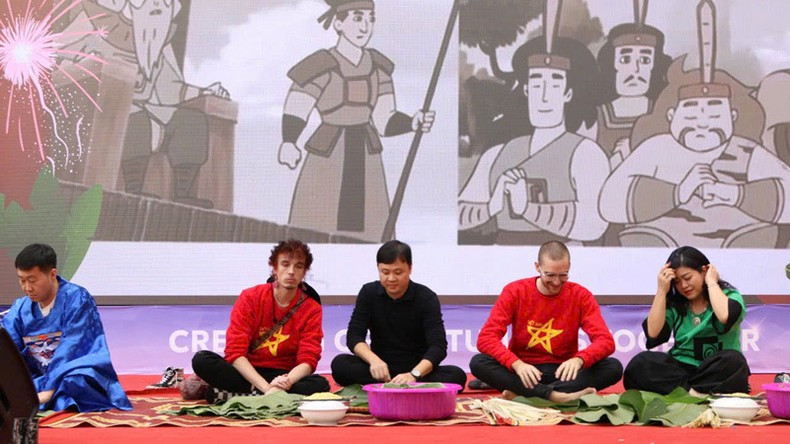 |
| Lecturers from the ULIS, Vietnam National University, Hanoi, guiding international colleagues in wrapping Chung cake — a meaningful activity to promote the beauty of Vietnamese culture. |
On the other hand, cultural preservation must go hand-in-hand with sustainable tourism development. Cultural tourism models and hands-on experiences that are integrated with lifelong learning enable both visitors and local communities to gain a deeper understanding of heritage. These approaches also provide practical learning opportunities through events such as cultural festivals, traditional craft fairs, and culinary exhibitions.
Lifelong learning not only enhances public intellectual capacity but also preserves the nation’s cultural essence and fosters socio-economic development, thereby becoming a driving force for the country’s sustainable development. To realise this vision, there must be coordinated efforts across the entire political system, proactive engagement from every individual, and strong support from technological advancements.
As General Secretary To Lam has stated, building a learning society is the shared responsibility of the entire Party and all the people. Each individual must actively pursue knowledge, promote a spirit of lifelong learning, and safeguard our core cultural values, thereby laying a solid foundation for Vietnam to thrive in the era of global integration while preserving its national identity.


